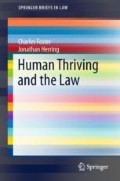Abstract
We began this book by demonstrating (in Chap. 1) that the law is rarely explicit about what account of human thriving it adopts when making best interests determinations. That judges must be making some assumptions about what is entailed by a Good Life is obvious. It is plainly desirable, for many reasons, that those assumptions are made explicit. The assumptions can sometimes be read between the lines of the judgments: we have tried to do so.
You have full access to this open access chapter, Download chapter PDF
Keywords
These keywords were added by machine and not by the authors. This process is experimental and the keywords may be updated as the learning algorithm improves.
We began this book by demonstrating (in Chap. 1) that the law is rarely explicit about what account of human thriving it adopts when making best interests determinations. That judges must be making some assumptions about what is entailed by a Good Life is obvious. It is plainly desirable, for many reasons, that those assumptions are made explicit. The assumptions can sometimes be read between the lines of the judgments: we have tried to do so.
The account adopted should take cognizance of the views about the nature of man and hence the nature of human thriving that have evolved over the millennia: we surveyed those views in Chaps. 2 and 3. And it should also take account of the evidence that has emerged about what, as a matter of fact, makes humans happy. We surveyed that evidence in Chap. 4. There is more to thriving than mere jollity or contentment, but deep, abiding happiness is, or approaches, the eudaemonia that Arisotle identified as the hallmark of the Good Life. We saw that there is a remarkable concordance between the views of the ancient human traditions about the Good Life and the findings of modern science about the elements of happiness, and an even more remarkable discordance between the evidence and the ancients, and the principles applied by the judges (when we can discern them). The difference turns on a view of the nature of the human person: until the Renaissance, humans were seen (as the science indicates that they are) as highly social, relational creatures, with concomitant duties and expectations. Thereafter they were increasingly seen as discrete islands. This unbiological view has been adopted by the courts, who make decisions on the basis of a simplistic pastiche of the highly complex, interrelational animals that humans really are. Good ethics, it is said, demand good facts. So does good law. It is time that the law got the facts right about the humans whose thriving is its only legitimate objective.
Author information
Authors and Affiliations
Corresponding author
Rights and permissions
Copyright information
© 2018 The Author(s), under exclusive license to Springer Nature Switzerland AG
About this chapter
Cite this chapter
Foster, C., Herring, J. (2018). Conclusion. In: Human Thriving and the Law. SpringerBriefs in Law. Springer, Cham. https://doi.org/10.1007/978-3-030-01135-2_6
Download citation
DOI: https://doi.org/10.1007/978-3-030-01135-2_6
Published:
Publisher Name: Springer, Cham
Print ISBN: 978-3-030-01134-5
Online ISBN: 978-3-030-01135-2
eBook Packages: Law and CriminologyLaw and Criminology (R0)

